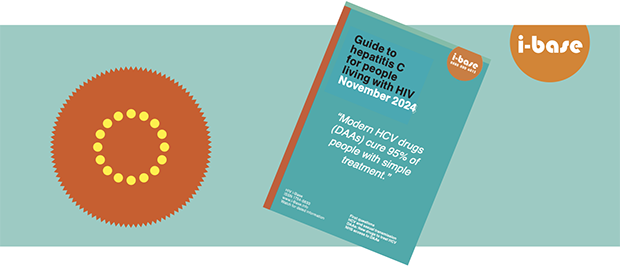Hepatitis C for people living with HIV
 HIV treatment is now highly effective and modern HCV drugs cure more than 95% people. These meds are called directly acting antivirals (DAAs).
HIV treatment is now highly effective and modern HCV drugs cure more than 95% people. These meds are called directly acting antivirals (DAAs).
This guide was revised and updated in November 2024.
Introduction
What is hepatitis C?
How is HCV transmitted?
- HCV transmission and reinfection
- Injecting drug use and HCV
- HCV and non-injecting drug use
- Other hepatitis viruses
- Sexual transmission of HIV
- Sexual transmission of HCV
- Heterosexual HCV transmission
- HCV transmission during sex between men
- Safer HCV sex for gay and bisexual men
- Chemsex
- PrEP (for HIV)
HCV and HIV coinfection
HCV and pregnancy
Natural history of hepatitis C
Finding out you have HCV – and getting support
Testing and monitoring
- Testing and monitoring
- HCV genotype and subtype
- Liver enzyme tests and others
- Liver stiffness (FibroScan)
- Other noninvasive biomarkers
- Screening for liver cancer in people with cirrhosis
Introduction to DAAs: treatment and management
- Introduction and goals of treatment
- Current DAA combinations
- What about side effects?
- How is the response to treatment measured?
- Recent HCV infection
- DAAs and HBV coinfection
- Drug interactions
- Retreating HCV
- HCV treatment and people who inject drugs
Treatment guidelines
Further links and information
How can I protect my liver?
PDFs and downloads
References
Feedback
Credits and disclaimer
Written and compiled by Simon Collins and Tracy Swan for HIV i-Base.
Thanks to doctors in the medical advisory group: Sanjay Bhagani, Duncan Churchill, Ed Ong, Alison Rodger and Chris Taylor.
Also to the community advisory group for review comments to all previous editions and to Beth Higgins for drawings.
People living with HIV and HCV are included in this review group.
Cover design and original layout of print edition by No Days Off. Produced by HIV i-Base.
ISBN: 1754-5633.
Disclaimer: information in this booklet is not intended to replace information from your doctor. Decisions relating to treatment should always be taken in consultation with your doctor.
About our guides
Information about how we produced this guide and the importance of using language that is direct and easy to understand.
This includes information on how to write non technical medical information that may be useful as a resource for other organisations.
Last updated: 1 November 2024.
